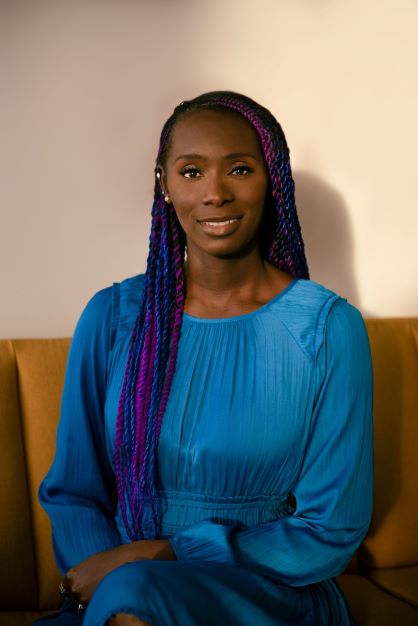Society and Culture
Research
Taking on Religious Taboos
Carmen Rojas - 15 June 2022

“I wanted to find something I was really interested in — not just to get ahead in a career, but for intellectual development and expansion,” says Gye, who completed her MA in Gender and Social Justice Studies part-time while working. “With everything that was happening with the Black Lives Matter movement, I thought ‘ok, it’s time to get more education on how to advocate for myself and people that look like me.’”
But early on in the program, Gye was inspired to follow a different direction. After reading guest discussant Dr. Doris Kieser’s article “The Female Body in Catholic Theology: Menstruation, Reproduction and Autonomy” for the GSJ 502 Gender and Research Workshop course, the idea for a research topic based on her own religious experiences began to take shape.
“This topic [of menstruation] affects everyone, but the majority of information out there is focused on cultural issues and not religion,” she says. “I could relate to some of the things the speaker was talking about, but I needed a more Muslim focus.”
Gye, whose project was supervised by Professor Felice Lifshitz, specifically decided to address Muslim women’s experiences of menstruation and period shaming during Ramadan. Since menstruating women are excused from fasting during the holy month of Ramadan, they end up getting questioned about why they’re not participating, Gye explains. “Being a taboo, being something that has been represented as shameful, you have Muslim women that will pretend to fast, or actually do fast, just so they won’t get questioned.”
Given the relevance of her topic to all Muslim women, Gye opted to do a documentary for the capping project rather than write a paper so that her work would be more accessible. She recruited seven Muslim women from Edmonton and Calgary for interviews, which she then turned into a 35-minute documentary entitled Men must not know: Concealment and Menstruation.
In the interviews, Gye and the participants discussed their feelings about period shaming during Ramadan and ways to normalize menstruation, particularly through early, age-appropriate education for both girls and boys.
The topic of social movements to end period poverty also came up, with the participants sharing their perspectives both as Muslims and as immigrants from parts of the world where clean water and sanitary products aren’t easily accessible.
“We’re on the right track but social activist movements should keep in mind the culture and religion of individuals,” Gye says. “Myself and all the participants didn’t agree with some of the vulgarity that people use on social media. It didn’t apply to us, and we need to see ourselves in it to make it more inclusive.”
To accompany her documentary, Gye also wrote a 10-page research paper focused on how Islam’s teachings around menstruation have been distorted. “Religion — which in Islam is dominated by men — has corrupted the actual teachings of what God intended for menstruating women, which was ease and no pain,” she explains. “From the beginning, depending on the culture or family you’re in, it’s represented as something shameful and dirty that you need to hide. We’re trying to push back and say that’s not actually Islam.”
Gye’s research gained the attention of local media earlier this year when she was interviewed for a CBC Radio Active segment about the Disney movie Turning Red, which created controversy among some parents by including multiple references to menstruation.
Her documentary has even reached her home country of Gambia in West Africa, where her mother shared it with an NGO that gives local women access to reusable pads and raises awareness about health and reproductive issues they might encounter.
Now, Gye is getting involved with the organization as well: with her MA completed and her second baby on the way, she plans to devote time during her upcoming maternity leave to setting up an Edmonton-based donation drive. She still has to work out the logistics, but Gye hopes to collect enough funds and products to make a difference where she knows it’s needed.
“Having reusable pads will be amazing for the women and girls back home in Gambia.”